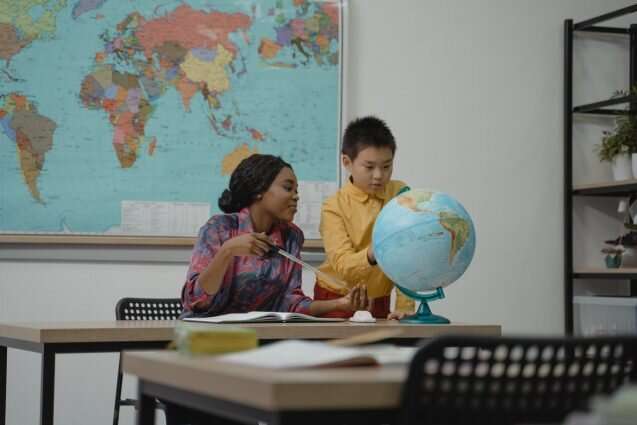Climate change education is failing our youth

"What are you studying at Columbia?" my friend asks as she helps me pack for my move from North Dakota to New York City. "Climate and Society," I promptly respond.
"What does that mean? What even is climate change and why is it political?" My friend, who is a sixth-grade middle school teacher in Bismarck, waits for my answer. She was born and raised in my home state of North Dakota and has finished four years of college at North Dakota State University. Yet, she sincerely did not understand what climate change was or why I would dedicate a year of my life studying it. She only associates the words climate change as a point of contention in contemporary politics.
I found this shocking since she is entrusted with educating the youth who will inherit an increasingly inhospitable planet.
As Pope Francis asserted, "Human-induced climate change is a scientific reality, and its decisive mitigation is a moral and religious imperative for humanity." He also posited, "We are not faced with two separate crises, one environmental and the other social, but rather one complex crisis which is both social and environmental."
The words of a prominent moral leader make it clear; climate change is a reality and immediate action is called for.
And yet, my friend's ignorance of the situation we are facing and that her students are subject to is echoed throughout the country, evident in the limited climate change education taught by the more than 400,000 middle-and high-school science teachers throughout the United States.
In 2016, the journal Science published the first peer-reviewed national survey of science teachers which investigated how the debate around anthropogenic climate change affects curricula. It discovered most middle- and high-school teachers incorporate only an hour or two of instruction about climate change over the course of an entire academic year. Thirty percent of teachers devoted less than an hour.
Even more alarming, most teachers do not accurately understand climate science to teach it properly. The Yale Program on Climate Change reported 70 percent of middle school and 55 percent of high school science teachers do not recognize the scientific consensus on climate change. And according to the National Center for Science Education, 40 percent of teachers who integrate climate change into their science curriculum teach it inaccurately.
With fewer than a third of middle school teachers and less than half of high school teachers educating their students on the human causes of climate change, it is clear the current educational curriculum covering climate change is failing our youth.
Considering America's youth are most at risk of suffering from the mounting repercussions of climate change, they deserve to learn the science free from the politicking that has halted climate action for decades.
Through national climate education, there is hope for collaboration across political parties and a resurgence of trust in science. Recent studies by the Yale Program on Climate Change Communication reveal younger generations of Republicans are more likely than their older counterparts to support climate activists, and are also more willing to join a campaign to convince elected officials to take action to reduce global warming.
Climate science must be mandated nationally as a standardized and testable curriculum for schools to implement, with clear guidelines and resources for instructors to teach it adequately. Teachers also need continued education on climate change through workshops and conferences, as well as up-to-date resources and easily accessible studies on the subject.
Some initiatives are already starting to roll out in certain areas. The Next Generation Science Standards—developed by state governments in conjunction with the National Research Council, the National Science Teachers Association, and the American Association for the Advancement of Science—incorporate climate science into the K-12 curriculum and has been adopted by 20 states within the US. The Center for Research on Educational Equity, Assessment & Teaching Excellence at UC San Diego has developed a pilot program, Creating Climate Champions, a collaborative effort among campus and community partners to develop lesson plans, in-class activities, and projects to aid San Diego county K-12 teachers. The curriculum is grounded in evidence-based climate science and Indigenous knowledge to empower students to act.
But, promising though these efforts are, they are manifestly inadequate given the scale of the task. These efforts must be ramped up on the national stage. We can look to Italy as a prime example. Since September 2020, teachers for every grade are mandated to teach a minimum of 33 hours on climate change and environmental sustainability, an initiative led by Italian Education Minister Lorenzo Fioramonti.
The ministry left no stones unturned. Teachers were trained to teach the curriculum reviewed by Jeffrey D. Sachs, director of Columbia University's Center for Sustainable Development, and Kate Raworth of Oxford's Environmental Change Institute.
In the United States, political actors must follow suit and mandate climate science curriculum for schoolchildren across the nation, just as other countries like Finland and Mexico have done or are working to do.
In 2021, the Yale Program on Climate Change Communication reported that 78 percent of registered voters support schools teaching children about the causes, consequences, and potential solutions to global warming. With public support mounting for climate education, it is time we demand action from the national government. Students and teachers alike need to be properly educated on climate science.
Instead of determining the future state of the planet for our youth, let's educate them with the accurate information they need to understand climate change and, when it's their turn, to take the steps required to ensure a livable future for all.
Journal information: Science
Provided by Earth Institute, Columbia University
This story is republished courtesy of Earth Institute, Columbia University http://blogs.ei.columbia.edu.



















